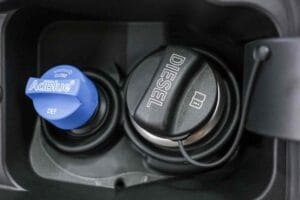Understanding AdBlue: The Key to Efficient DEF Usage
AdBlue, also known as Diesel Exhaust Fluid (DEF), has become an essential solution in reducing harmful emissions in diesel engines. This fluid, composed of 32.5% urea and 67.5% deionized water, helps diesel engines meet emission standards set by various regulations. But how exactly does AdBlue work, and what are its other applications, such as its role in NPK fertilizers?
In this blog post, we’ll explore the essentials of AdBlue, its use, and its importance in various sectors.
1. What is AdBlue?
AdBlue is a high-purity urea-based solution used in Selective Catalytic Reduction (SCR) technology to reduce nitrogen oxide (NOx) emissions in diesel vehicles.

2. How Does AdBlue Work in Diesel Engines?
When injected into the exhaust system, AdBlue breaks down into ammonia, which reacts with NOx, converting it into harmless nitrogen and water vapor.
3. AdBlue and DEF: Are They the Same?
Yes, AdBlue is simply a brand name for DEF, which is widely used across Europe. DEF, or Diesel Exhaust Fluid, is critical for keeping diesel engines eco-friendly.
4. The Role of AdBlue in Emission Reduction
By using AdBlue in SCR systems, diesel vehicles can meet stringent Euro 6 emissions standards, significantly reducing air pollutants.
5. AdBlue in Agriculture: NPK Fertilizers
AdBlue’s main component, urea, also plays an important role in producing NPK (Nitrogen, Phosphorus, Potassium) fertilizers. These fertilizers enhance crop yields by providing essential nutrients to the soil.
6. What Happens If a Vehicle Runs Out of AdBlue?
If a diesel vehicle’s AdBlue tank is empty, the engine will reduce its performance or stop running altogether, as it won’t meet the emissions standards required by law.
7. How to Store AdBlue
AdBlue needs to be stored in a cool, dry place, away from direct sunlight to maintain its effectiveness. Prolonged exposure to heat can degrade the solution.
8. DEF and AdBlue: Environmental Benefits
DEF solutions like AdBlue help significantly reduce harmful emissions, supporting global efforts to combat air pollution.
9. AdBlue and DEF in Heavy Industries
In addition to vehicles, AdBlue is used in heavy-duty equipment, such as construction machinery and agricultural vehicles, to ensure these large machines comply with environmental standards.
10. The Future of AdBlue
With ongoing environmental regulations, the demand for AdBlue is expected to rise, making it a crucial component in the future of clean diesel technology.
FAQs about AdBlue
- What is the shelf life of AdBlue?
- AdBlue has a shelf life of around 12 months if stored properly in a cool, dry place.
- Can I make my own AdBlue?
- No, AdBlue is a highly specific urea solution that must meet strict quality standards, and attempting to create your own could damage your vehicle.
- What happens if I accidentally put AdBlue in my fuel tank?
- This can seriously damage your engine. It is essential to seek professional help immediately if AdBlue is mistakenly added to the fuel tank.
- Is AdBlue harmful to the environment?
- AdBlue is non-toxic and safe for the environment, but it must be used correctly to prevent issues like ammonia release.
- How often do I need to refill AdBlue?
- The frequency of refilling depends on your vehicle’s consumption, but generally, it needs to be refilled every few thousand kilometers.
